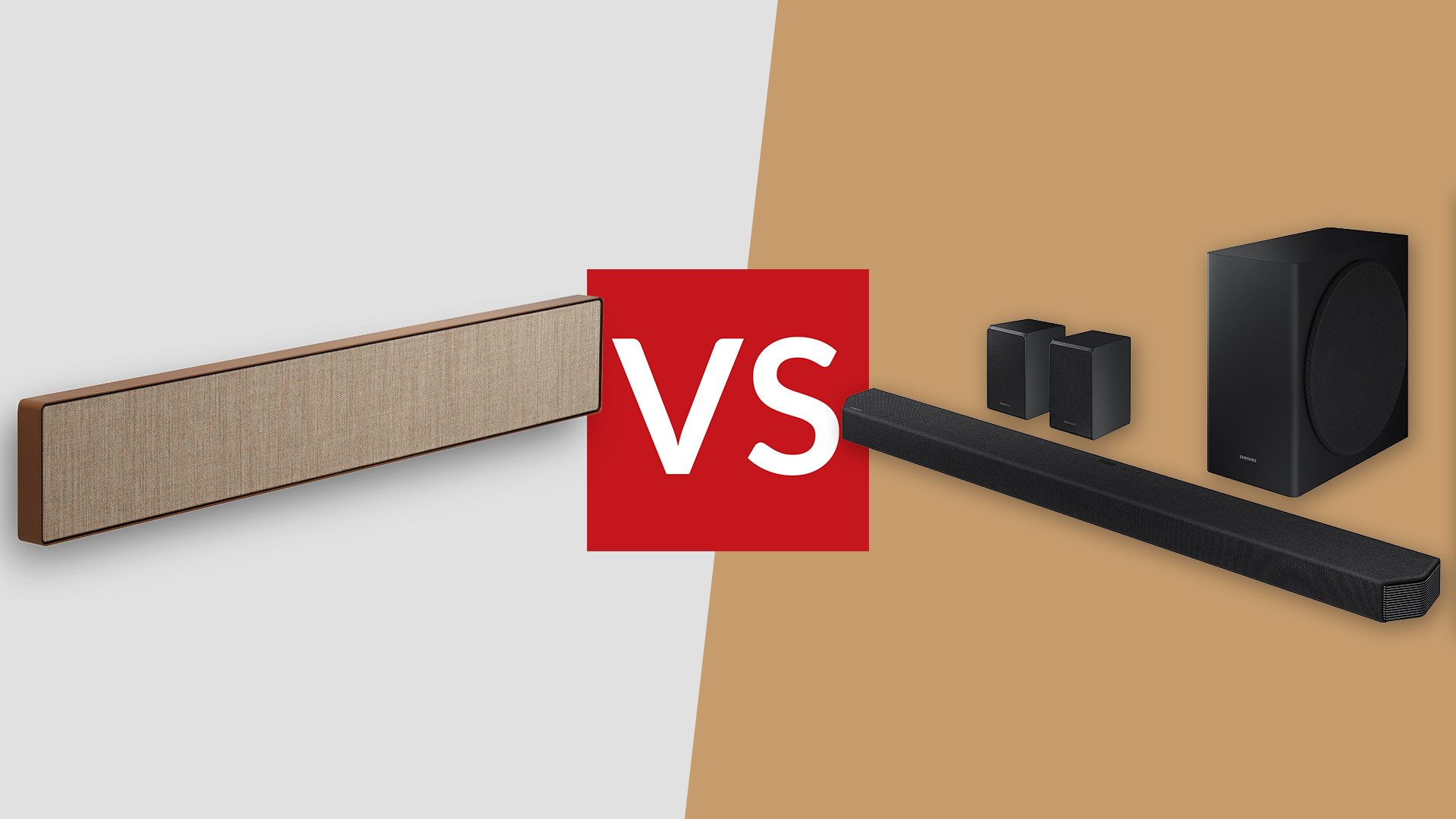
Get all the latest news, reviews, deals and buying guides on gorgeous tech, home and active products from the T3 experts
You are now subscribed
Your newsletter sign-up was successful
When it comes to the best soundbars for delivering immersive audio, there are normally two types of system: the first seeks to deliver as encompassing an experience as possible from a single unit; while the second expands the soundstage using a separate subwoofer and rear speakers to actually surround you.
While neither approach is wrong, they obviously have competing strengths and weaknesses. A single box is more compact and convenient; a multi-box system can create more convincing surround effects.
The B&O Beosound Stage and Samsung HW-Q950T are two great examples, with the former aiming to deliver an elegant one-box solution still with elite audio, and the latter taking the multi-speaker route for the ultimate home theatre experience.
They're pretty similar in pricing, so let's take a look at where they differ, so you can better decide which earns a place in your home. Also not to be missed is the updated Samsung Q990B, a T3 Award winner 2022, which is truly top-tier stuff also worth your consideration.
Samsung HW-Q950T vs B&O Beosound Stage: Price & features
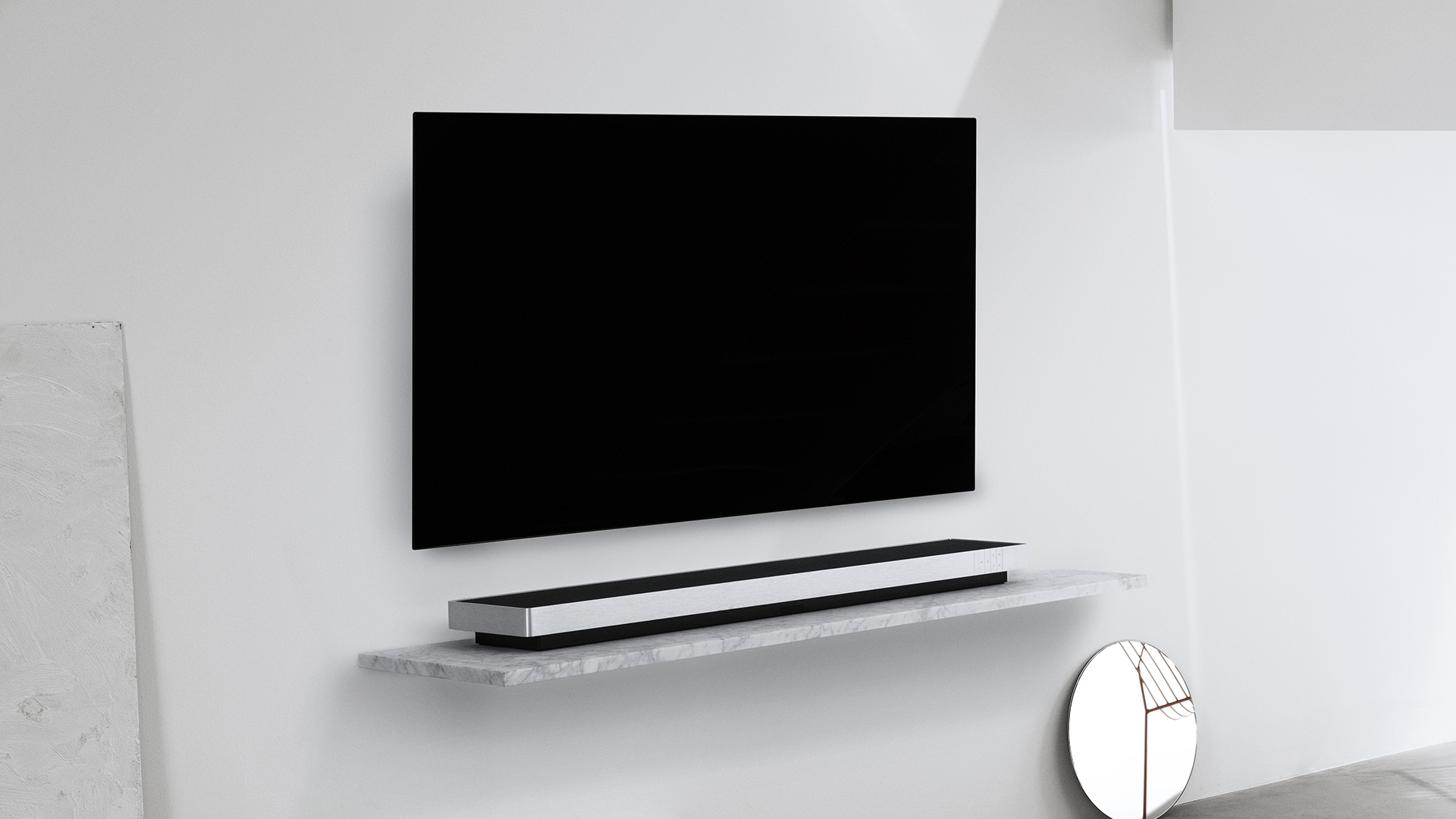
B&O's Beosound Stage.
The two soundbars are fairly close in terms of price, with the exception of Australia, where the the Samsung is massively cheaper than the B&O. The Samsung HW-Q950T costs £1,299/$1,499/AU$1,379, while the B&O Beosound Stage costs £1,250/$1,750/AU$2,495. That's actually the start price for the B&O – if you choose and higher-end finish, the costs rise. Oh, and it doesn’t come with a remote control, but you can set it up with the B&O app and control it using your TV remote, of course. A remote is available, for a few hundred (really) more.
The Beosound Stage supports Dolby Atmos using eleven drivers in a three-channel configuration, plus clever digital processing. There’s an HDMI input and output that pass 4K and high dynamic range (HDR10 and Dolby Vision), while the latter also includes eARC. The only other physical connection is a 3.5mm jack, but there’s also Wi-Fi and Bluetooth, plus support for Chromecast, AirPlay 2 and BeoLink.
The Samsung HW-Q950T uses 20 speakers to create a full 9.1.4-channel system that delivers Dolby Atmos and DTS:X immersive audio. There are two HDMI inputs and an output, all of which pass 4K and high dynamic range (HDR10, HDR10+ and Dolby Vision), plus the latter includes eARC. There’s an optical input, Wi-Fi, Bluetooth, and AirPlay 2, along with built-in Alexa, and Samsung’s Q Symphony feature.
Get all the latest news, reviews, deals and buying guides on gorgeous tech, home and active products from the T3 experts
Samsung HW-Q950T vs B&O Beosound Stage: Design & setup
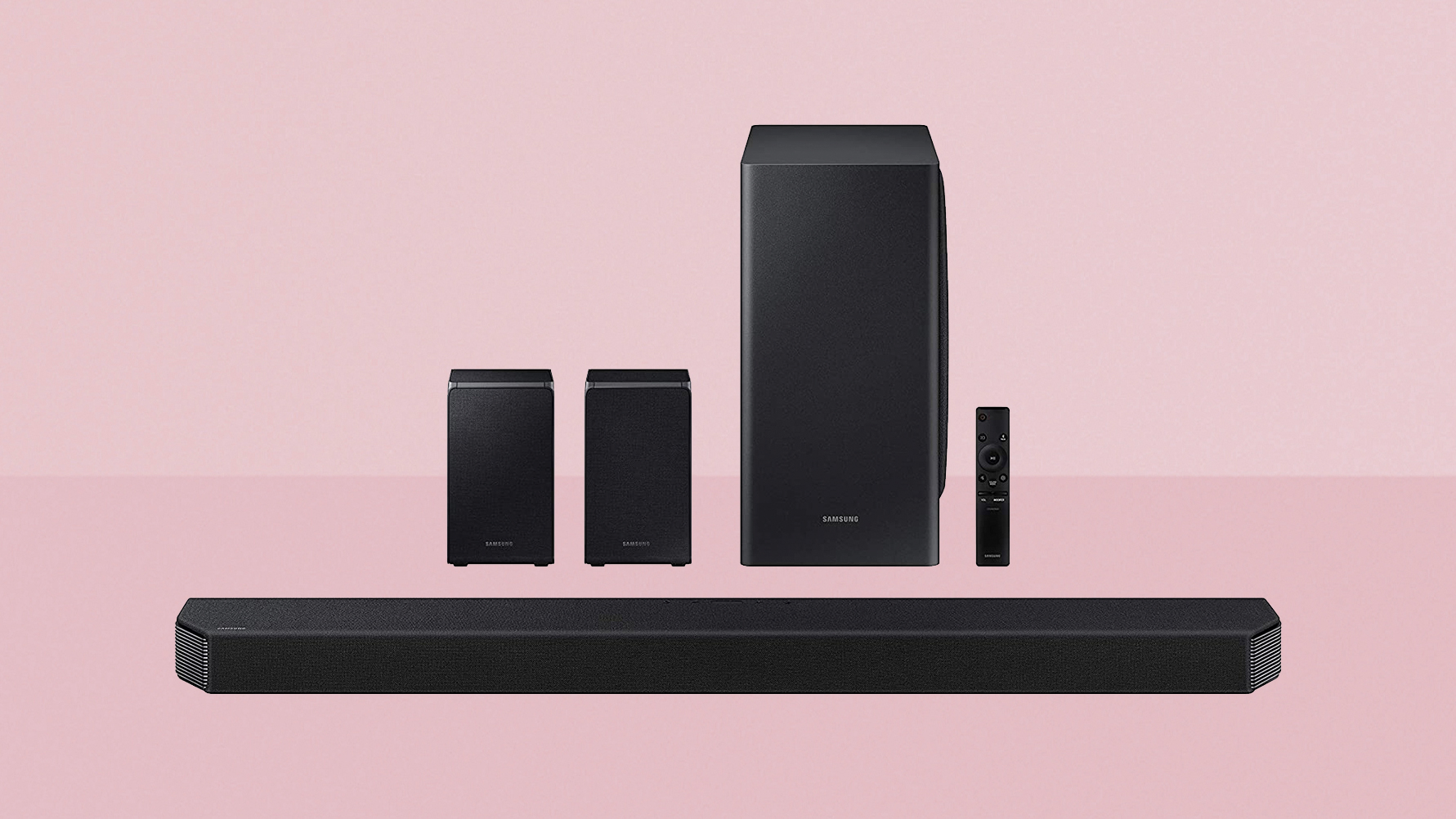
The Samsung HW-Q950T is a lot of soundbar for the money.
The Beosound Stage benefits from B&O’s Scandinavian design flair and looks like no other soundbar. At 1100x77x170mm, it’s fairly large, but the aluminium styling is sleek and there’s a choice of natural, taupe or bronze finishes. There’s no display, but you do get an engraved touch sensitive control panel, and a fabric grille composed of the Kvadrat material that's ubiquitous on this kind of hi-fi.
The Stage can be installed horizontally or vertically, you simply specify which orientation using the B&O app, and everything you need is in the box. Then it’s just a case of connecting the bar to your TV using the included HDMI cable, and choosing between the TV, Music, Movie and Night sound modes. These can also be customised using the ToneTouch interactive equaliser.
The Samsung HW-Q950T looks more traditional with a black main unit that’s covered in Kvadrat fabric and measures 1232x70x138mm. There is a display, but for some reason it’s located on the top where you can’t see it. You’ll find some basic controls up there as well, and Samsung also includes a decent remote control. The subwoofer and surrounds are styled to match the bar.
The HT-Q950T requires a bit more thought when installing, but the wireless nature of the sub and rear speakers makes this easier. The SmartThings app takes you through establishing a wireless connection and setting up Alexa, after which you simply connect the TV and any sources. The tricky bit is getting all fourteen channels balanced, but careful adjustment pays sonic dividends.
Samsung HW-Q950T vs B&O Beosound Stage: Sound quality
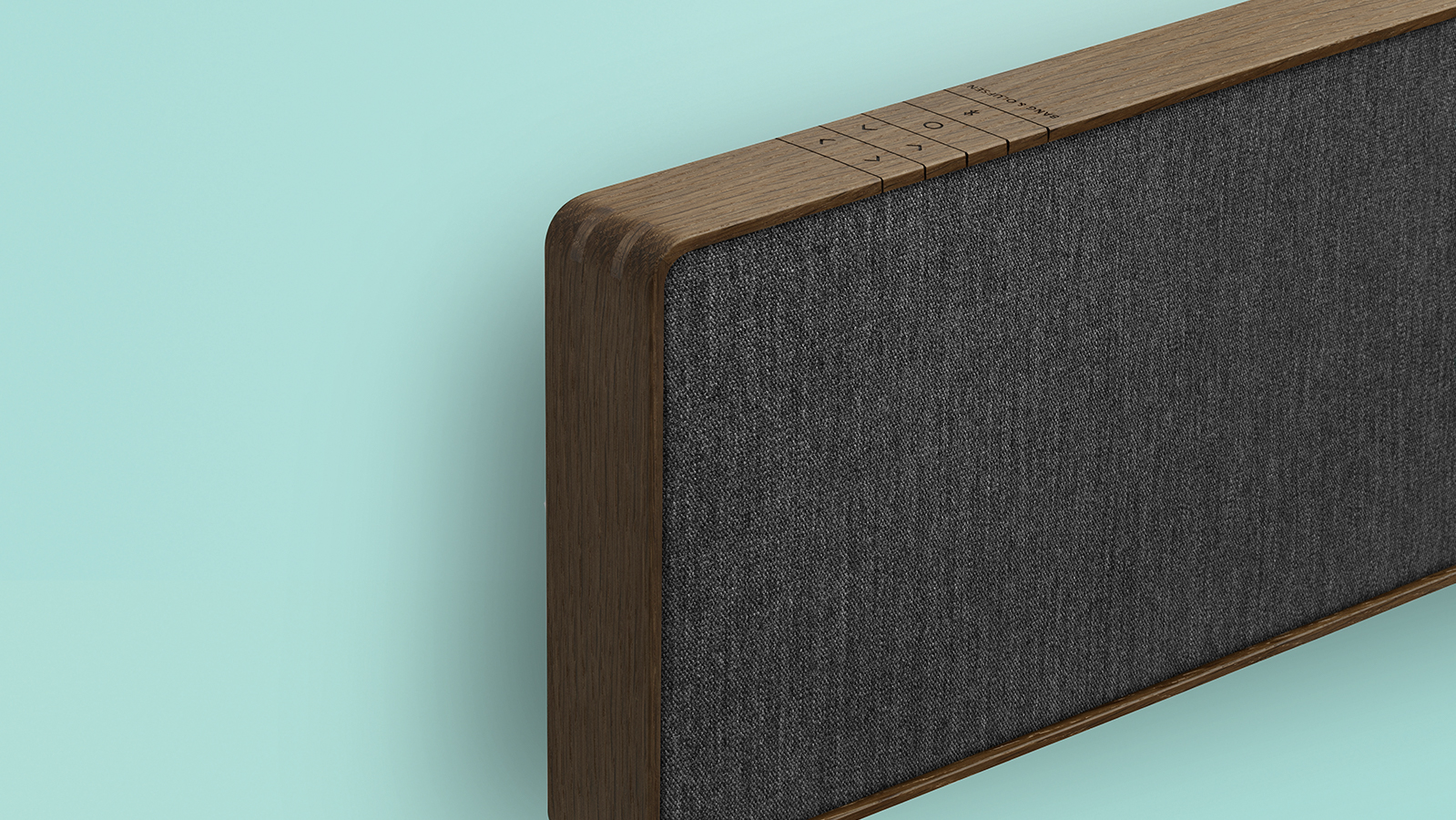
The Beosound Stage might only have three channels, but they’re composed of 11 drivers in total, each with 50W of Class D amplification. The result is a seriously powerful system, and an exceptional level of sound quality. The dedicated centre speaker ensures dialogue remains clear, and the four built-in woofers generate a surprising amount of bass.
The Stage renders music with clarity and precision, and it handles movie soundtracks with a similar level of control. Since there are only three channels, the immersive sensation associated with Dolby Atmos is created using psychoacoustic processing. This sonic sleight of hand gives the audio increased dimensionality, and is generally very effective.
However, when it comes to object-based 3D audio there’s no substitute for more channels, and the HT-Q950T has these in spades. The main unit alone has no less than nine specific channels – three at the front, two at the sides, two width speakers and two firing upwards. Add in the sub plus the surrounds with their own built-in upward-firing drivers, and you have a 9.1.4 system driven by 550W of digital grunt.
The performance is stunning with Atmos and DTS:X soundtracks, creating a genuine sense of immersion that’s superior to just about any other soundbar. The front soundstage is wide, the surrounds fill in the rear and the four upward-firing drivers steer effects overhead. The sub digs deep, providing a solid foundation of bass that ensures a visceral cinematic experience.
Samsung HW-Q950T vs B&O Beosound Stage: Verdict
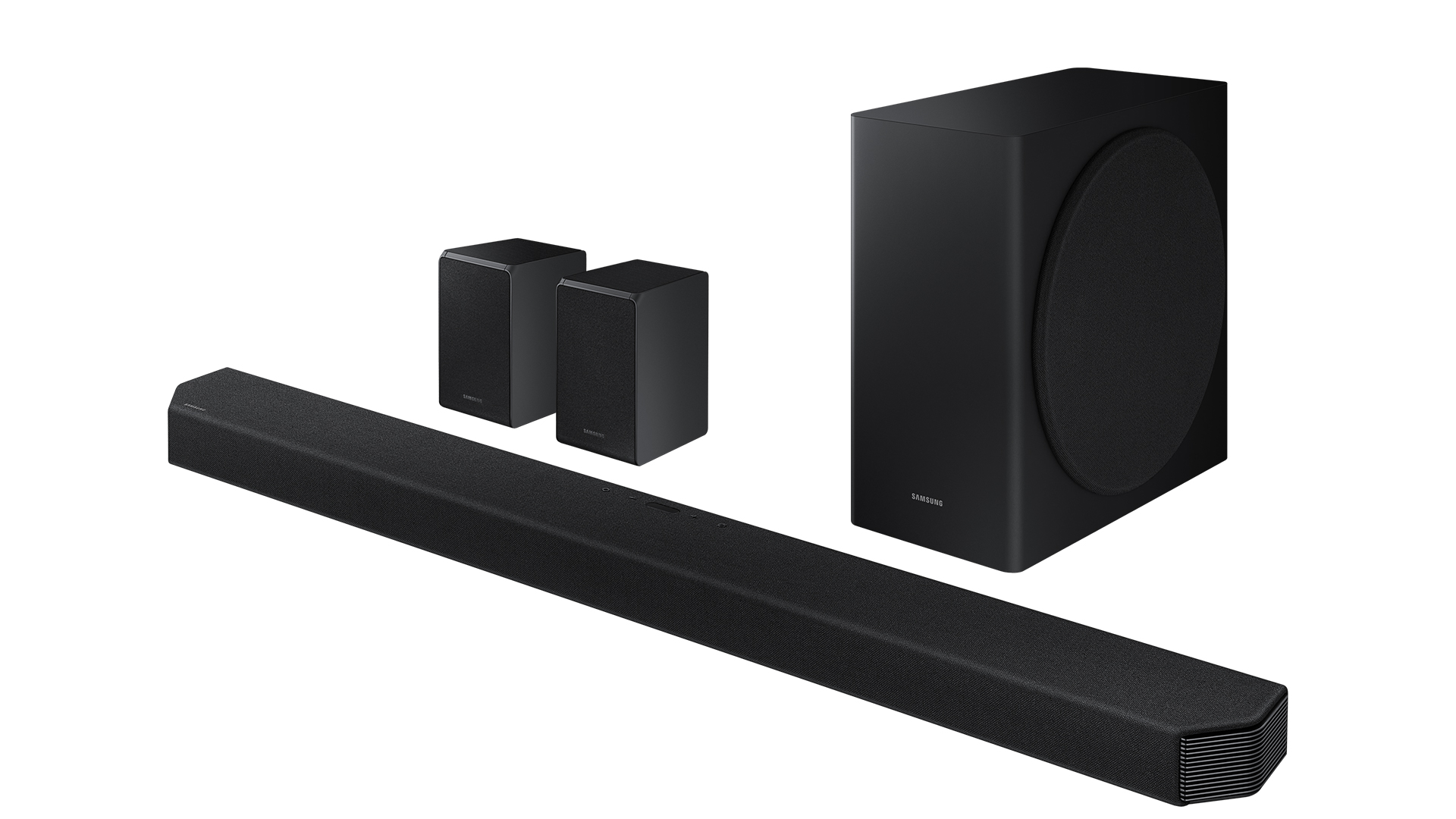
Which soundbar you choose is really going to come down to taste and practicality. If you love B&O’s minimalist cool and superior build quality, or simply don’t want a sub and rear speakers in your lounge, then you’ll love the Beosound Stage. It’s limited to Dolby Atmos and delivers it using acoustic processing, but it sounds fantastic with TV shows and movies, and is probably the single best soundbar for handling music.
Alternatively, if you’re more than happy to add a sub to the front of the room and stick surrounds at the rear, then go for the Samsung HW-Q950T. This is one of very few soundbars that can realistically give a separates system a run for its money, and the Dolby Atmos and DTS:X performance is exceptional. If you’re serious about movies and want full immersion and tons of power, this is the bar for for you.

Steve Withers is a professional calibrator and freelance journalist who regularly contributes to T3, reviewing audio and video products, and writing articles. Steve has been writing about audio and video products for over ten years and, along with T3, he also contributes to TechRadar, Trusted Reviews, Expert Reviews, AVForums, Pocket-lint, Home Cinema Choice, and Wired. Steve is Level 2 certified with THX, the Imaging Science Foundation (ISF) and the Home Acoustics Alliance (HAA). As such, he remains abreast of all AV technology developments and the latest industry standards as we transition into a new era in home video and audio.
